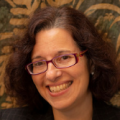Participants in professional seminars at Yad Vashem’s International School for Holocaust Studies
Professional seminars at Yad Vashem’s International School for Holocaust Studies are quite intense - packed with lectures, workshops, various interdisciplinary sessions and tours of the Yad Vashem campus. At the conclusion of these programs, participants often comment on their exhaustion and emotional overload,yet usually underscore, “We would not have changed a thing. It was a unique experience. Thank you.”
More than 2,700 educators from every continent except Antartica, study every year at Yad Vashem’s International School for Holocaust Studies. Over the course of the summer, approximately 30 seminars will be coordinated out of our new International Seminars Wing – with educators from Austria, Belgium, Croatia, Germany, Greece, Italy, the Netherlands, Romania, the United Kingdom and more converging on the Yad Vashem Campus. Our educators are also bringing the School's pedagogical expertise abroad, coordinating 25 seminars across the European continent during the summer alone – from Dublin, Ireland to Kazan of the Russian Federation, as well as additional seminars during this period in Ukraine and in Latvia.
At the completion of every seminar at Yad Vashem, we collect and record the participants' comments and reflections on their experiences, enabling us to assess what has been achieved: teachers who study at Yad Vashem not only buttress their knowledge and gain pedagogical insights, but also undergo a special experience. Participants have remarked that studying at Yad Vashem has provided them with "life education," inspiring them to become better teachers as well as better human beings.
A few of our teachers' comments:
A Greek educator on June 28, 2013, provided the following feedback:
“The main thing is that I learned many new things about the Holocaust and this knowledge I intend to share not only with my friends and colleagues but also to transfer to my pupils.”
A Cypriot educator - attending our first-ever seminar for teachers from Cyprus - sent us the following seminar evaluation on June 26, 2013:
“The whole seminar and the presentations and our educators were just great. The work that you are doing here can be used as a paradigm on the way we cope with historical issues. The seminar broadened my experience as a teacher and as a person. Thank you again.”
On June 30, 2013, a seminar participant from Bitola stated:
"With the stay in Yad Vashem many questions were answered. I will use some of the things in my classes. But many questions are still unanswered. How could a man do such things? Why did no one said “stop”? Many, many questions are without an answer. But one thing is sure. Everything what I saw will stay in my memory until the end of my life."
On July 21, an educator from the Netherlands reflected:
“The hospitality was great on the whole. The lectures were good as well as the opportunity to think intensively about this subject. I liked the discussion with colleagues and learned from it. There was variety in the program and this was good. You have a reservoir of educational talent…”
This overwhelmingly positive feedback provides a well of inspiration for us at the International School while the participants' constructive criticism helps Yad Vashem experts further improve our educational programming in the future. Throughout the year, we receive updates from our graduates about the new directions that they have taken in their teaching as a result of what they have learned at Yad Vashem. Graduates like Gertraud Hoheneder who used the story of an Austrian Jewish survivor that she met in Jerusalem to write a text book in German tailored to non-Jewish elementary school children and Olena Zhadko of Ukraine who developed an educational unit for young students called "Ruined Childhood" that uses the experiences of girls and their dolls during the Holocaust to help them better understand the struggles of young children during the Shoah are examples of just what a few of our graduates are accomplishing back in their hometowns. We are proud of the creative endeavors and accomplishments of our seminar graduates, and of the impact they generate in their own communities.
Click for more information about upcoming international seminars >>>
The work of the European Department is made possible by the generous support of the ICHEIC Humanitarian Fund and the Adelson Family Foundation.











